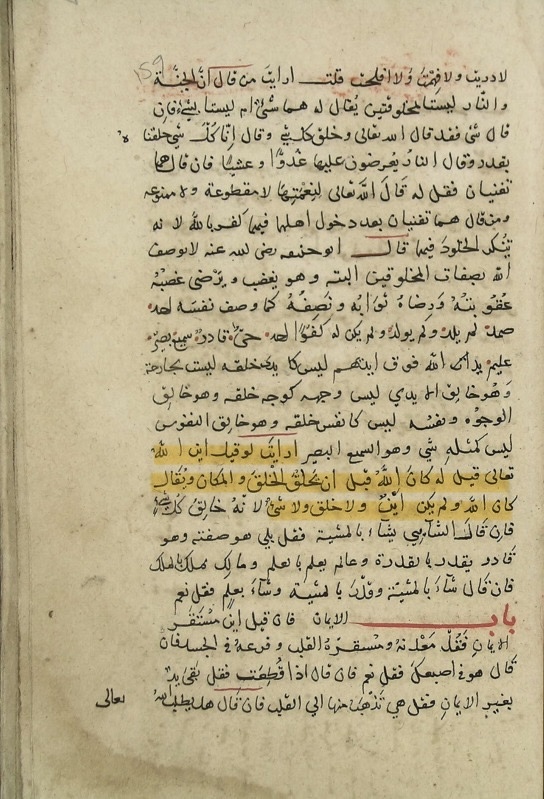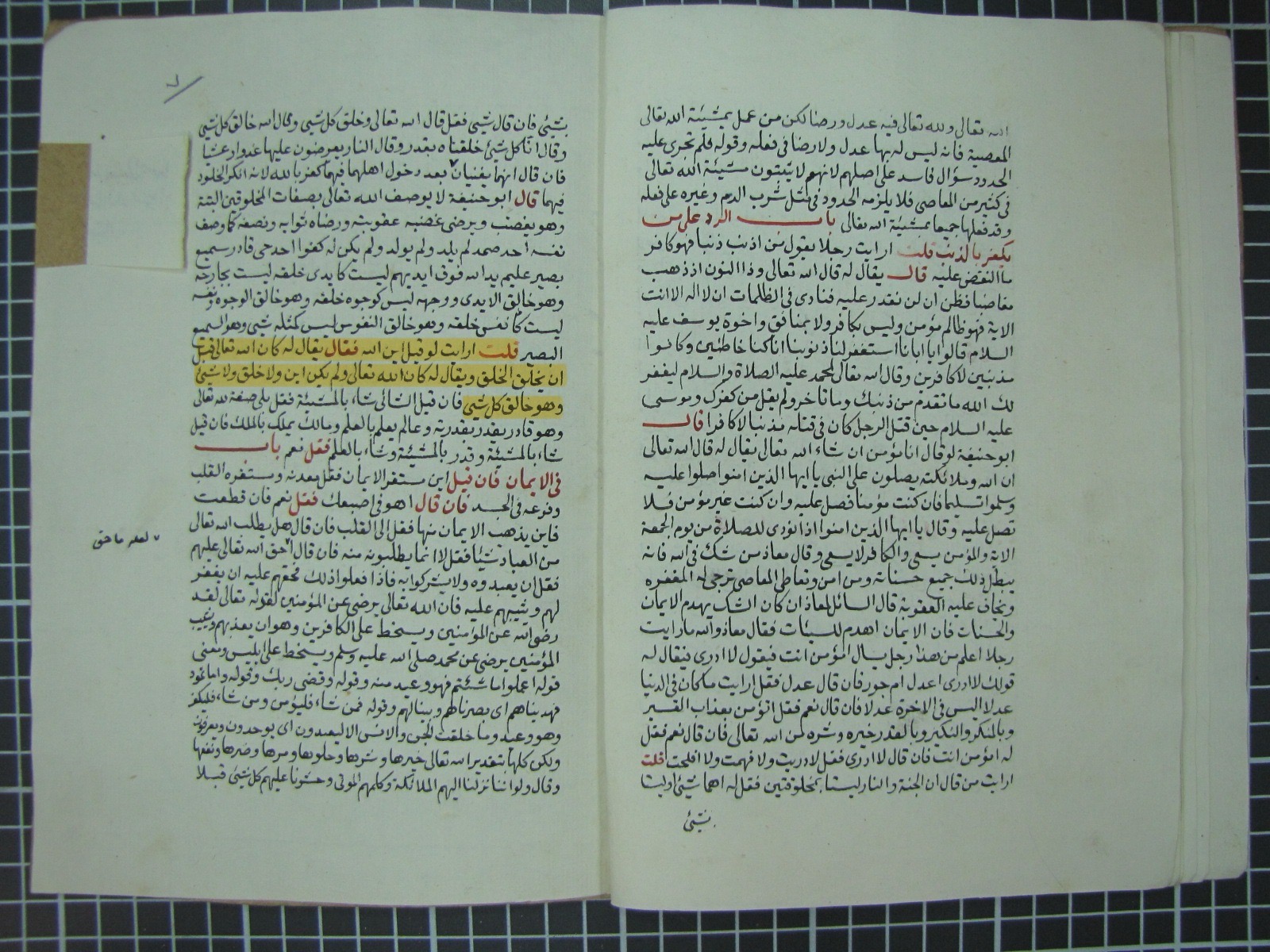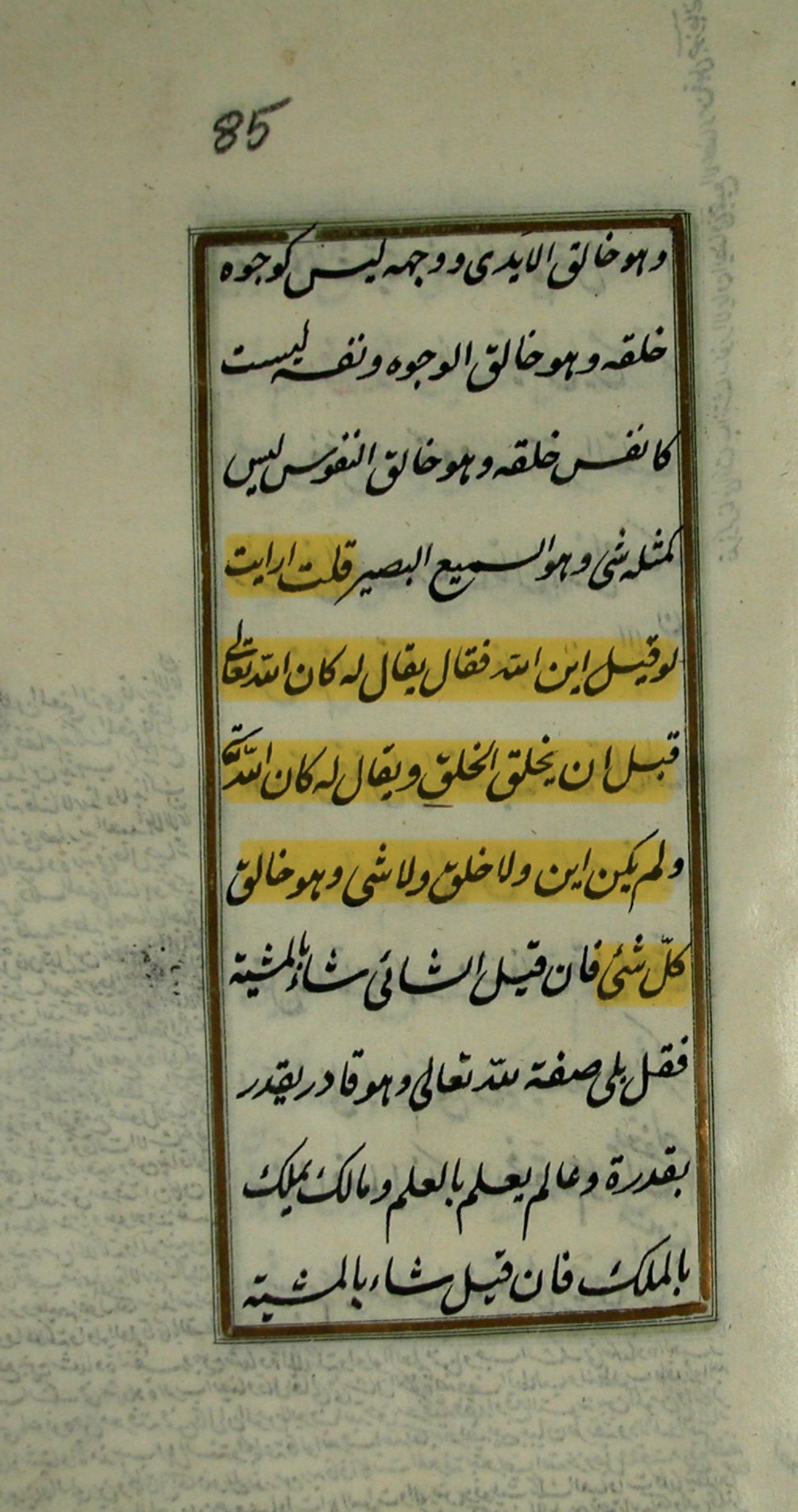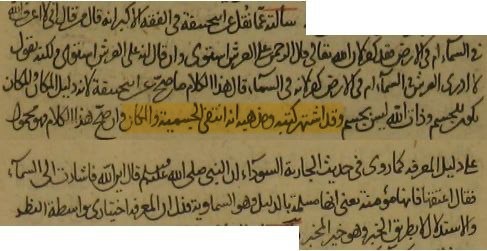﷽
Introduction:
All praise be due to Allāh and may peace and blessings be upon his chosen Messenger and upon his pure family and Companions until the day of resurrection.
Abū Muṭī’ al-Balkhī asks:
If someone were to ask, “Where is Allāh?”
Abū Ḥanīfa responds by saying:
It is said to that person: God existed prior to creating creation; it is also said to him: God existed and there was no “place,” creation, or anything else (besides him). (1)
This passage has often been cited by Sunni Muslims in order to prove that Abū Ḥanīfa adhered to the doctrine of God existing without a place and a negation of perpetual creation, which was famously championed by Ibn Taymiyyah al-Ḥarrānī. Sunni Muslims have been faced with the following objections against the authenticity of this specific passage:
- The earliest form of the book (Abū al-Layth al-Samarkandī’s explanation of it) does not include this passage.
- It contradicts a passage that is in the same book.
Whilst responding to these concerns, we will also rigorously prove the authenticity of the statement. Before proceeding, however, we must prove the authenticity of al-Fiqh al-Akbar (the transmission of al-Balkhī) otherwise, if we prove this specific statement is part of the original book, then that won’t be of use if the book itself is not correctly attributed to al-Balkhī.
Al-Fiqh al-Akbar I of Abū Muṭī’ al-Balkhī, a closer look at it’s attribution
Before proceeding, it is important to note that the correct attribution of a book to an author does not depend on its chain of transmission. The standards of the partisans of Hadith are for individual reports and not for books. This is a fact that partisans of Hadith, such as Ibn Hajar al-‘Asqalani, have accepted for themselves. He writes:
“..Because a famously attributed book is not in need of being dependent upon a chain of transmission to its author.” (2)
Thus, when analysing the authenticity of al-Fiqh al-Akbar I, pointing out defects (‘illal) in its chain of transmission is an academic betrayal to sound methodology of the partisans of Hadith. Nevertheless, we stipulated that for a book to be soundly attributed to its author, it must be famously attributed to him. Thus, we will list the different attestations from early scholarship for this work.
Ibn al-Nadīm:
Ibn al-Nadīm (d.385/990) writes:
“He (Abū Ḥanīfa) has authored: “al-Fiqh al-Akbar”, his treatise to al-Bastī (he means, al-Battī), the book “al-Aalim w. Muta’alim” which was narrated by Abū Muqātil (al-Samarkandī) and the book “al-Radd ‘ala al-Qadariyyah.” (3)
Ibn al-Nadīm is a biographer and historian, this is significant as this is his field of study and knowledge. It is also our earliest attribution for this book.
Abū Isḥāq al-Isfaraynī (d.418/1027)
He writes:
“..and the book [al-Fiqh al-Akbar] which was narrated to us by the trustworthy in a relied upon way with an authentic chain of transmission.” (4)
Abdul Qāhir al-Baghdādī (d.429/1037):
Al-Baghdadī writes: “For indeed, Abū Ḥanīfa has a response to the Qadariyyah which is named [al-Fiqh al-Akbar].” (5)
Al-Nāṭifī (d.446/1055):
Before proceeding to quote Al-Nāṭifī, it is important to understand exactly who he is. He was an important Hanafi jurist who wrote a book named “al-Ajnās“. The purpose of this book was to collect authentic narrations narrated from Abū Ḥanīfa and his students. Thus, his book is highly regarded in the Ḥanafī school as it preserves lost narrations and what he deemed authentic.
He writes:
“In the book [al-Fiqh al-Akbar] is what was said by Abū Muṭī’ al-Balkhī..” (6)
Fakhrul Islām al-Pazdawī (d.486/1089)
Imam al-Pazdawī is considered a mujtahid in the Ḥanafī school (7), thus he is authoritative and knows what has been authentically transmitted from Abū Ḥanīfa considering he is one of the most important scholars of the school.
He writes:
“And Abū Ḥanīfa composed the book [al-Fiqh al-Akbar] and he affirmed in it the attributes..” (8)
Ṣadrul Islām al-Pazdawī (d.493/1100)
He writes:
“And he (Abū Ḥanīfa) wrote books, some of them have reached us and some of them were erased by the people of innovation and desires, and from the books that have reached us is: [al-Aalim w. Al-Muta’alim] and the book [al-Fiqh al-Akbar].” (9)
Due to the mass attestation by early Muslim scholarship of the book being authentically attributed to Abū Ḥanīfa, we can confirm that it is indeed his work. However, this is something that even later authorities such as Ibn Taymiyyah (10) and al-Dhahabi (11) believed, and most of our interlocutors tend to accept this claim.
Is Abū Ḥanīfa’s negation of spacial location for God a case of later interpolation?
Before discussing the two evidences brought forth to prove this claim, we first must analyse the manuscripts and related quotations of this passage.

Manuscript (A)

Manuscript (B)

Manuscript (C)
As the reader can see, this passage of Abū Ḥanīfa negating a location for God is found in three, relied upon manuscripts of the book. These are the manuscripts that I have been able to locate, however there are more manuscripts for the book and due to the corroborative evidence we are about to present we can be sure that the passage is present there too.
Imām al-Bayāḍī:
Imām al-Bayāḍī (d.1098/1687) was a rigorous Ottoman verifier of the creedal works of Abū Ḥanīfa. He collected a book where he arranged his creedal beliefs based on the manuscripts of the books that reached him. He compiled these beliefs in a book named “al-Uṣūl al-Munīfah”. From the passages present in the book is the following:
“He (Abū Ḥanīfa) said in [al-Fiqh al-Absaṭ]:
“God almighty existed without being located in a place, he existed before creating the creation. He existed, and there was no “where” or creation or anything at all and he is the creator of all things.” (12)
Rukn al-dīn al-Kirmānī (d.565/1149)
Imam al-Kirmānī states in his collection of legal verdicts:

From his book:
جواهر الفتاوى
“And his (Abū Ḥanīfa’s) books and view are famous (shtuhira) that he negates corporeality and a location [from God]”
Although he does not explicate the mention of al-Fiqh al-Akbar I, it is safe to assume he is referring to that passage and the passage in the introduction of “al-Aalim w. Muta’alim” as it’s the only places where Abū Ḥanīfa negates such things from God almighty.
Al-Zāhid al-Ṣaffār (d.534/1140)
Imām al-al-Ṣaffār writes:
“It has been narrated from Abū Ḥanīfa, may God be pleased with him, that he was asked about God so he responded: [God existed and there was nothing besides him, he exists as he pre-eternally existed and he will exist [as he pre-eternally existed].” (13)
This is a clear narration of what is in al-Fiqh al-Akbar I even if the wording is not exactly the same but the passage clearly has a basis and the meaning remains the same.
Abū Shakūr Al-Sālimī (d.460/1068)
The following quotation we are about to present is the most important in proving the authenticity of this passage as it is the most earliest. Al-Sālimī is a celebrated theologian in the Ḥanafī tradition and his book “al-Tamhīd” is considered to be a relied upon work.
He writes:
”Abū Muṭī’ al-Balkhī says: I asked Abū Ḥanīfa about the person who says: “I don’t know where God is” Abū Ḥanīfa said: “He exits the religion because he described God with being in every place. Abū Muṭī’ says: “Why does he exit the religion?” He (Abū Ḥanīfa) says: Because he went against the text (of the Qur’an) and God almighty says: “al-Rahman ‘ala al-Arsh istawa” Abū Muṭī’ said: “How did he do this? Abū Ḥanīfa responded: “Believe in it as it came, the response is: God pre-eternally existed without a place.” (14)
As we can see, the very earliest reference we have of this passage has a different wording but the meaning is still there and remains the same. It’s also noteworthy to mention that the objection made by orientalists and our Muslim interlocutors that the passage contradicts Abū Ḥanīfa supposedly affirming a location for God is explicitly refuted in this quote. The earliest quotation of that quote shows the reasoning why that person would exit the religion of Islam and it is because he attributed God with being inside a location (something no Muslim says).
Absence from Samarkandī’s edition?
Another claim raised is that the text was explained by Abū al-Layth al-Samarkandī, who lived in the fourth century, yet this passage is not found there.
The truth of the matter is that this book is not al-Samarkandī’s at all; only two of the seven manuscripts claim he is the author. A closer investigation of the dating of these manuscripts leads us to believe that the earliest extant manuscripts attribute it to an unknown individual.
There are contradictions between the teachings of al-Samarkandī in his established works and this attributed book to him, for example, in whether prophets can sin.
The book mentions disputes with the Ash’ari school, but the disputes between the Hanafi’s and Ash’ari’s directly mentioning each other only became prominent in the 5th century, during the lifetime of Abū al-Mu’īn al-Nasafī. (15)
Given the corroborating early evidence, citations, and quotations found in extant manuscripts, we can conclude that the book is authentic, as is the specific negation of a location from God.
it’s also worth mentioning that it is not far fetched for Abū Ḥanīfa to have written a book responding to the Qadariyya considering that it is reported that 70 Qadarites entered his city and he was at the forefront of responding to them (16). As a theologian, Abū Ḥanīfa would have concerned himself with responding to the most popular creedal deviance of his time.
___________________
(1) مجموع كتب ورسائل ووصايا الإمام الأعظم ص. ٣٣٦، مكتبة الغانم
(2) النكت على كتاب ابن الصلاح لابن حجر العسقلاني ١/٢٧١، الجامعة الإسلامية. ويوجد نفس النص في كتاب “تدريب الراوي” للسيوطي وكتاب فتح المغيث للسخاوي
(3) الفهرست لابن نديم ص. ٢٨٥، دار المعرفة
(4) التبصير في الدين لأبي إسحاق الإسرفاييني ص.١٨٤
(5) أصول الدين للبغدادي ص.٢٠٨ الطبعة الأولى
(6)الأجناس للناطفي ٢/٤٤٥، دار المأثور
(7)راجع شرح عقود رسم المفتي لابن عابدين
(8)كنز الوصول ص.٨٩، دار السراج
(9)أصول الدين للبزدوي ص. ١٥
(10)الفتوى الحموية الكبرى, دار الصعيمي. ص.٣١٨. ووصف الكتاب بأنه مشهور عند أصحاب المذهب
(11)تاريخ الإسلام ص. ١٠٩٧، دار الغرب الإسلامي
(12)الأصول المنيفة ص. ٧٤، دار الصالح
(13)تلخيص الأدلة ص. ٢٠٩، مؤسسة الريات
(14) التمهيد ص.١٠٢-١٠٣
(15) For a full discussion on why it is not authentic, see: Rudolph, U. (2014). Al-Māturīdī and the Development of Sunnī Theology in Samarqand. Netherlands: Brill. p.325-328
(16) كشف الآثار الشريفة ٢/١٤٤